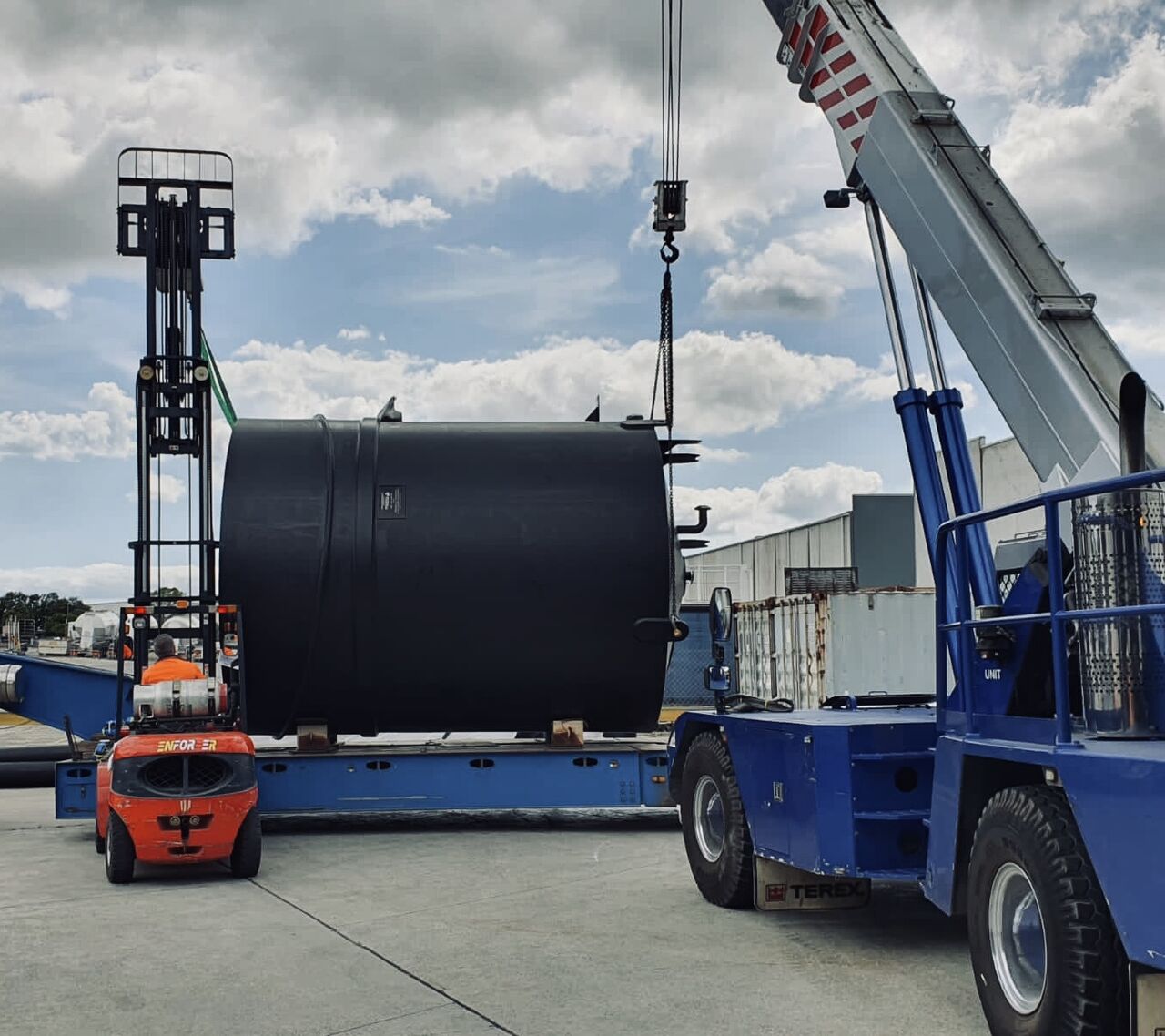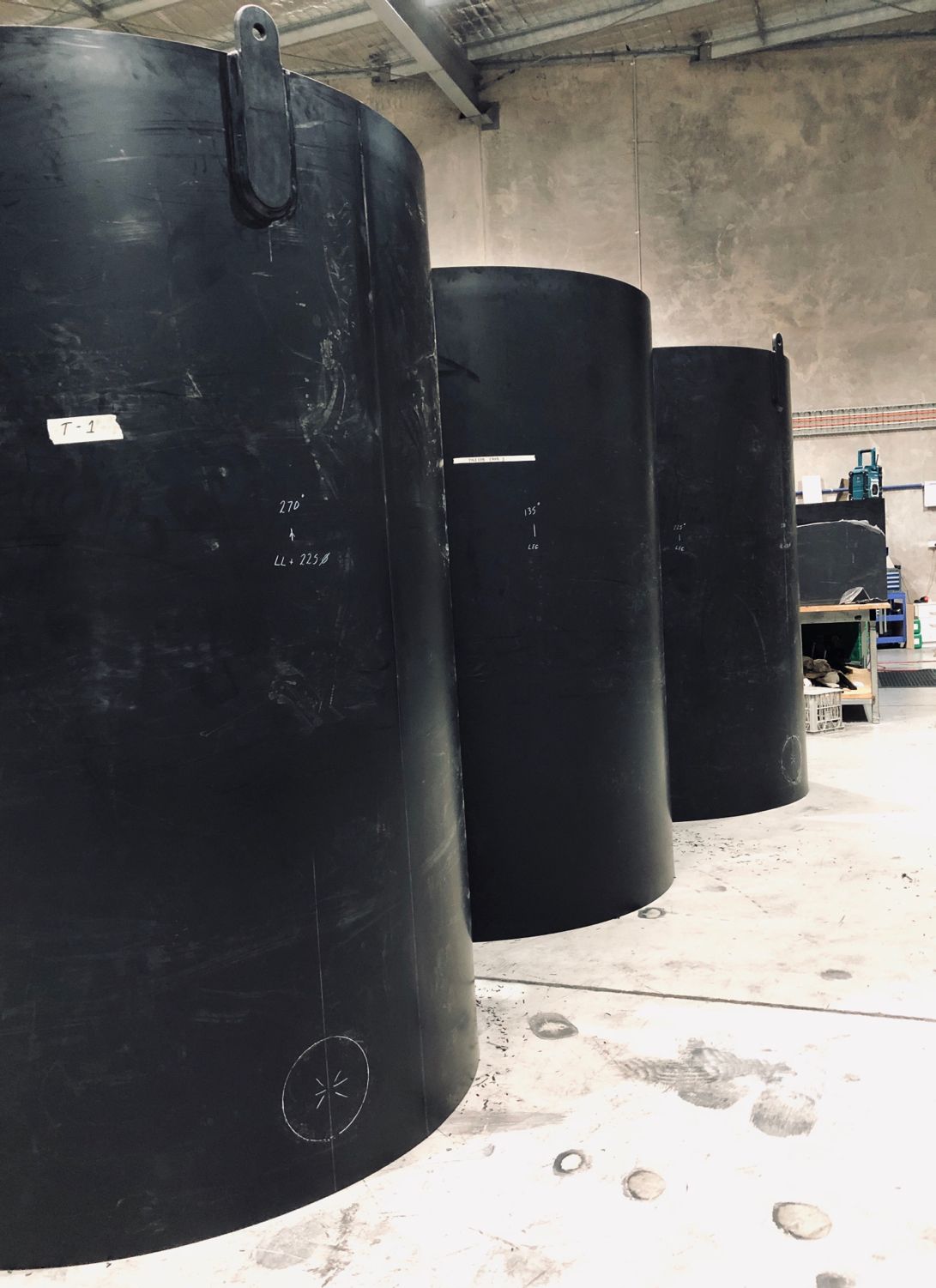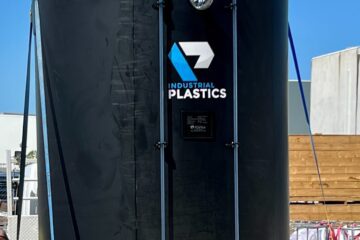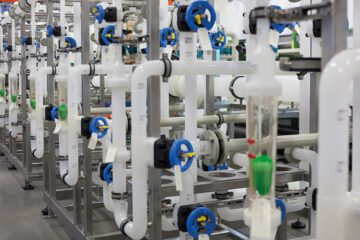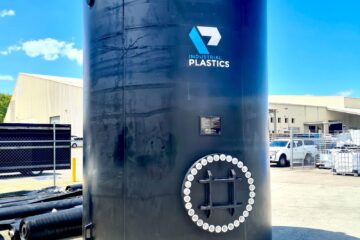The end of the year is always a busy time at Industrial Plastics and this year is no different. Within the last month, our warehouse has fabricated a variety of High-Density Polyethylene products. These HDPE fabrications include prefabricated pipe spools, and cylindrical, rectangular, and custom tanks. Industrial Plastics continue to provide high-quality products to our customers and looks forward to exceeding their expectations. If your business requires more information on our HDPE capabilities, please contact us via email or call 1300 465 888.
Unlocking the Benefits of HDPE Fabrications: Quality Matters
HDPE fabrications are an essential part of many industrial operations in Australia. As a highly engineered plastic, HDPE is used to create prefabricated pipe spools, cylindrical tanks, rectangular tanks, and custom-designed solutions for specific applications. In this blog post, we’ll take a look at what makes HDPE such an important material for these fabrications as well as why quality management systems like ISO are so vital when it comes to creating safe and reliable products with the right specifications. So if you’re looking to find out more about hdpe fabrications then read on.
What is HDPE?
HDPE stands for High-Density Polyethylene, a type of polyolefin that is used in the production of many industrial products. It is a thermoplastic polymer with high strength and stiffness, making it an ideal material for use in engineering applications. HDPE has excellent chemical resistance properties and can withstand extreme temperatures, making it suitable for use in many industries including mining, manufacturing, water treatment, and agriculture.
Definition of HDPE:
HDPE is a synthetic plastic composed of molecules made up of carbon and hydrogen atoms linked together by covalent bonds. The molecules are arranged into long chains which form the basis for its strength and rigidity when exposed to heat or pressure. Its molecular structure also makes it resistant to chemicals such as acids or alkalis which can corrode other materials over time.
Another major benefit of using HDPE is its low cost compared to other engineered plastics such as PVC or ABS. Additionally, due to its strong molecular structure, it does not require additional reinforcement when used in structural applications like pipes or tanks; this reduces costs even further since no extra support materials need to be purchased or installed during fabrication processes. Finally, because it does not absorb moisture from the environment easily (unlike wood), there are fewer chances for mold growth on surfaces where moisture may accumulate over time – making this material perfect for outdoor applications such as agricultural storage tanks where humidity levels may fluctuate significantly throughout the year.
HDPE is a versatile and cost-effective material that has many applications in industrial settings. Our prefabricated pipe spools provide quality assurance and convenience for customers, making them an ideal choice for any project.
Key Takeaway: HDPE is an ideal material for industrial applications due to its strength, stiffness, chemical resistance, low cost, and lack of moisture absorption. It can be used in many industries such as mining, manufacturing, water treatment, and agriculture.
Prefabricated Pipe Spools
Prefabricated pipe spools are a cost-effective and efficient way to construct pipelines for various industrial applications. They are made from high-density polyethylene (HDPE), which is an extremely durable material that can withstand extreme temperatures, pressures, and chemicals. HDPE is also lightweight and easy to transport, making it ideal for large projects such as mining operations or water treatment plants.
Design and Fabrication Processes:
Prefabricated pipe spools are designed using computer-aided design (CAD) software in order to ensure the accuracy of the final product. Once the design has been finalized, the pipes must be cut into sections according to their specified lengths before being welded together with electrofusion welding machines. The welds must then be tested for strength and integrity before they can be used in any application.
Prefabricated pipe spools offer several advantages over traditional piping methods, including reduced installation time due to the preassembly of components, improved safety due to fewer joints requiring sealing, lower labor costs associated with assembly, increased durability due to higher quality materials, better flow characteristics due to uniform wall thickness throughout each section and improved corrosion resistance thanks to its chemical composition.
Prefabricated pipe spools are a cost-effective and reliable solution for many industrial applications. Cylindrical tanks offer additional advantages in terms of capacity, design flexibility, and safety that make them the ideal choice for certain projects.
Key Takeaway: Prefabricated pipe spools offer several advantages, including reduced installation time, improved safety, lower labor costs, increased durability, and better flow characteristics.
Cylindrical Tanks
Design and Fabrication Processes:
Cylindrical tanks are typically constructed from high-density polyethylene (HDPE) material. This type of plastic is known for its durability, strength, and chemical resistance. The fabrication process begins with the design phase, where engineers will create a 3D model of the tank based on customer specifications. Once approved by the customer, the HDPE sheets are cut to size using a computer numerical control (CNC) machine. The pieces are then welded together using hot air welding techniques to form a watertight seal.
Advantages of Cylindrical Tanks:
Cylindrical tanks offer several advantages over other types of storage containers due to their shape and construction materials. They have excellent structural integrity which makes them ideal for storing liquids or gases under pressure or in hazardous environments. Additionally, they can be easily customized to meet specific requirements such as capacity or dimensions without compromising performance or safety standards.
Quality assurance standards must be followed when manufacturing cylindrical tanks in order to ensure that they meet all applicable safety regulations and industry standards such as ASME/ANSI B31 piping codes and ASTM D2513 plastic pipe fittings standardization guidelines. All welding processes should also be inspected regularly throughout production in order to guarantee that each tank meets quality requirements before being shipped out for use in various industries including mining, manufacturing, water treatment plants, and agriculture.
Cylindrical tanks are an effective solution for many industrial applications, and our team of experts has the experience to design and fabricate them with precision. Next, we’ll discuss rectangular tanks and their unique benefits.
Rectangular Tanks
Design and Fabrication Processes:
HDPE rectangular tanks are custom designed for a variety of applications, such as water storage, chemical containment, wastewater treatment, and agricultural irrigation. The design process begins with the selection of the appropriate material grade based on the application requirements. Once the material is selected, CAD software is used to create a 3D model of the tank that includes all necessary dimensions and features. After this step is complete, fabrication can begin using CNC machining or thermoforming processes depending on size and complexity.
Advantages of Rectangular Tanks:
Rectangular tanks offer several advantages over other types of tanks due to their shape. These include increased strength-to-weight ratio compared to cylindrical tanks; improved stability in high wind conditions; more efficient use of space when storing multiple units side by side; and easier access for maintenance purposes due to their open top design. Additionally, they can be manufactured in larger sizes than cylindrical tanks which makes them ideal for large scale industrial applications such as mining operations or manufacturing plants where large volumes need to be stored safely.
Rectangular tanks are a versatile and cost-effective option for many industrial applications. With our custom fabrication process, we ensure the highest quality standards to meet your specific needs. Now let’s take a look at how we can create custom tanks that suit your exact requirements.
Key Takeaway: Rectangular tanks offer advantages such as increased strength-to-weight ratio, improved stability, more efficient use of space, and easier access for maintenance. They are ideal for large scale industrial applications due to their ability to be manufactured in larger sizes than cylindrical tanks.
Custom Tanks
Design and Fabrication Processes:
Custom tanks are designed and fabricated from HDPE, a thermoplastic polymer that is lightweight yet strong. The fabrication process begins with the design of the tank, which includes determining its size, shape, thickness, and other specifications. Once the design is finalized, it is sent to a fabricator who will cut and weld the pieces together using specialized equipment such as heat guns or welding machines. The final product must then be tested for quality assurance before being shipped to its destination.
Advantages of Custom Tanks:
Custom tanks offer several advantages over traditional steel tanks due to their lightweight construction. They are easier to transport than steel tanks since they can be moved in one piece instead of having to be broken down into smaller parts for transportation. Additionally, custom tanks require less maintenance than steel tanks because they do not corrode or rust like metal does when exposed to moisture or chemicals. Finally, custom tanks are often more cost-effective than steel alternatives since they require fewer materials and labor costs during production.
Key Takeaway: Custom tanks offer several advantages over steel tanks due to their lightweight construction, ease of transport, reduced maintenance needs and cost-effectiveness.
FAQs in Relation to Hdpe Fabrications
What is HDPE fabrication?
HDPE fabrication is the process of cutting, shaping, and joining high-density polyethylene (HDPE) materials to create components for industrial applications. HDPE is a thermoplastic material that offers excellent chemical resistance, durability, and strength. It can be used in many industries such as mining, manufacturing, water treatment, and agriculture due to its ability to withstand extreme temperatures and pressures. Fabrication involves cutting the material into desired shapes with saws or lasers before welding it together using heat fusion techniques. This ensures tight seals between parts while also providing superior structural integrity compared to other plastic materials.
Can you screw into HDPE?
Yes, it is possible to screw into HDPE (High-Density Polyethylene). This type of plastic is known for its strength and durability, making it a popular choice in industrial applications. It can be machined with standard metalworking tools such as drills and taps, allowing screws to be inserted without any additional preparation. However, due to the material’s low coefficient of friction, special thread-forming screws may be required for optimal performance. For best results when using this method of fastening on HDPE parts, contact an experienced industrial plastics fabricator like ours here at [Company Name] for advice on selecting the right screw type and size.
How to work with HDPE?
HDPE, or High-Density Polyethylene, is a thermoplastic polymer used in industrial applications. It is strong and durable yet lightweight and flexible, making it an ideal material for many projects. Working with HDPE requires the right tools and techniques to ensure a successful outcome. To cut HDPE correctly, use sharp blades such as saws or shears designed specifically for cutting plastics. When welding HDPE together, use hot air guns to heat up the plastic until it melts into one piece. Finally, when machining HDPE parts be sure to use high-speed bits that are designed for cutting plastics so that you can achieve accurate results without damaging the material. With these tips in mind, you should have no problem working with HDPE successfully.
What are HDPE pipe manufacturers?
HDPE pipe manufacturers are companies that specialize in the production of high-density polyethylene (HDPE) pipes. These pipes are used for a variety of industrial applications, such as water supply and distribution, sewage collection and treatment, irrigation systems, gas pipelines, mining operations, and more. HDPE pipes offer superior strength and durability compared to other types of plastic piping materials. They are also resistant to corrosion and can withstand extreme temperatures without compromising their structural integrity. As a result, they provide an ideal solution for many industrial projects where long-term performance is essential.
Conclusion
In conclusion, HDPE fabrications are a popular choice for many industrial applications in Australia. They provide strength and durability with minimal maintenance requirements. Quality management systems like ISO ensure that these products meet the highest standards of quality and safety. When looking for HDPE fabrications, it is important to choose a reliable supplier who can provide prefabricated pipe spools, cylindrical tanks, rectangular tanks or custom tanks that meet your specific needs.
Are you in need of HDPE fabrications for your industrial needs? Look no further than Industrial Plastics! We provide the best quality and reliable solutions for mining, manufacturing, water treatment, and agriculture industries. Our experienced team is ready to help you create customised products that are tailored to meet all your requirements. Contact us today so we can get started on creating a solution just right for you!
